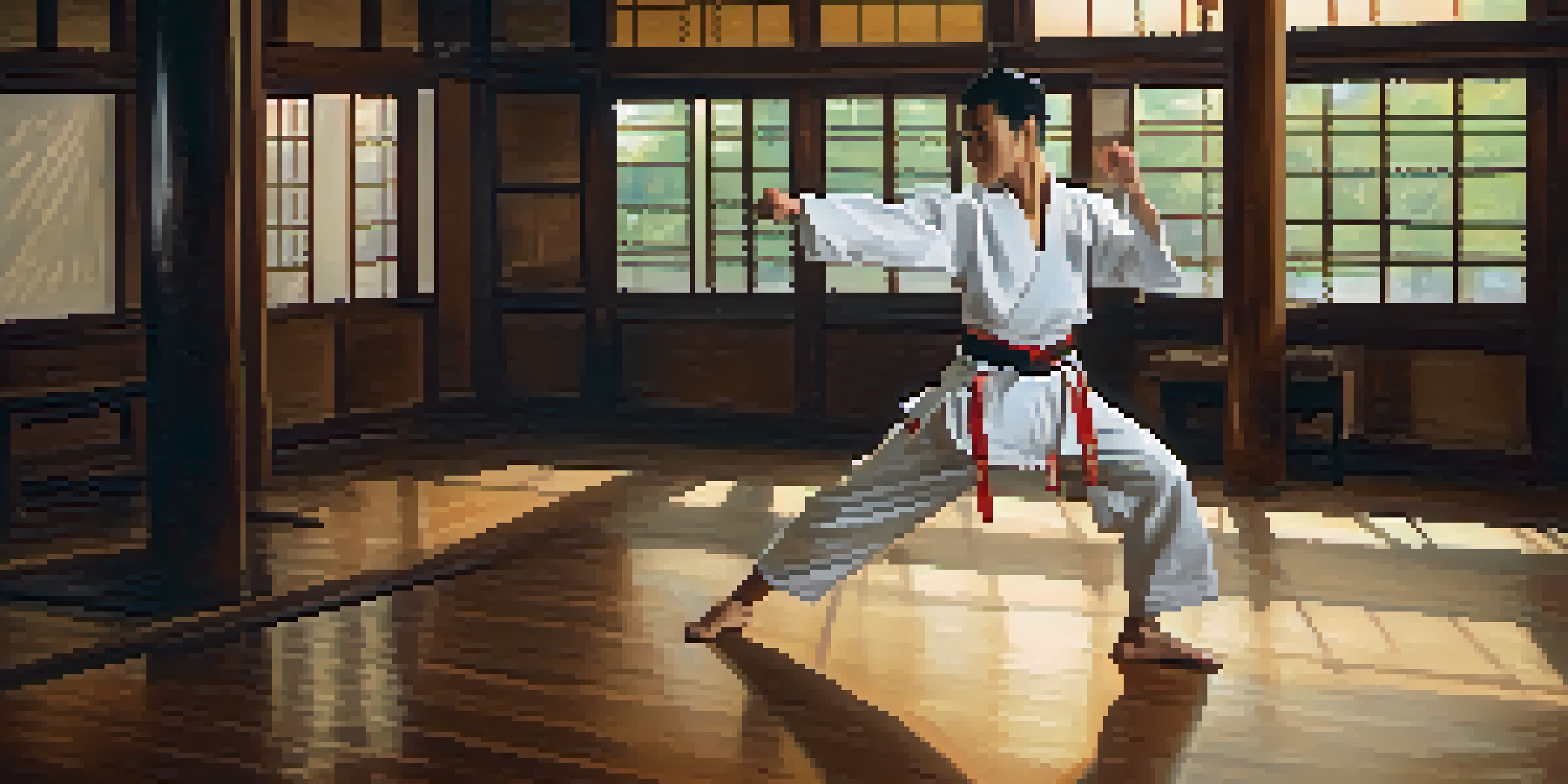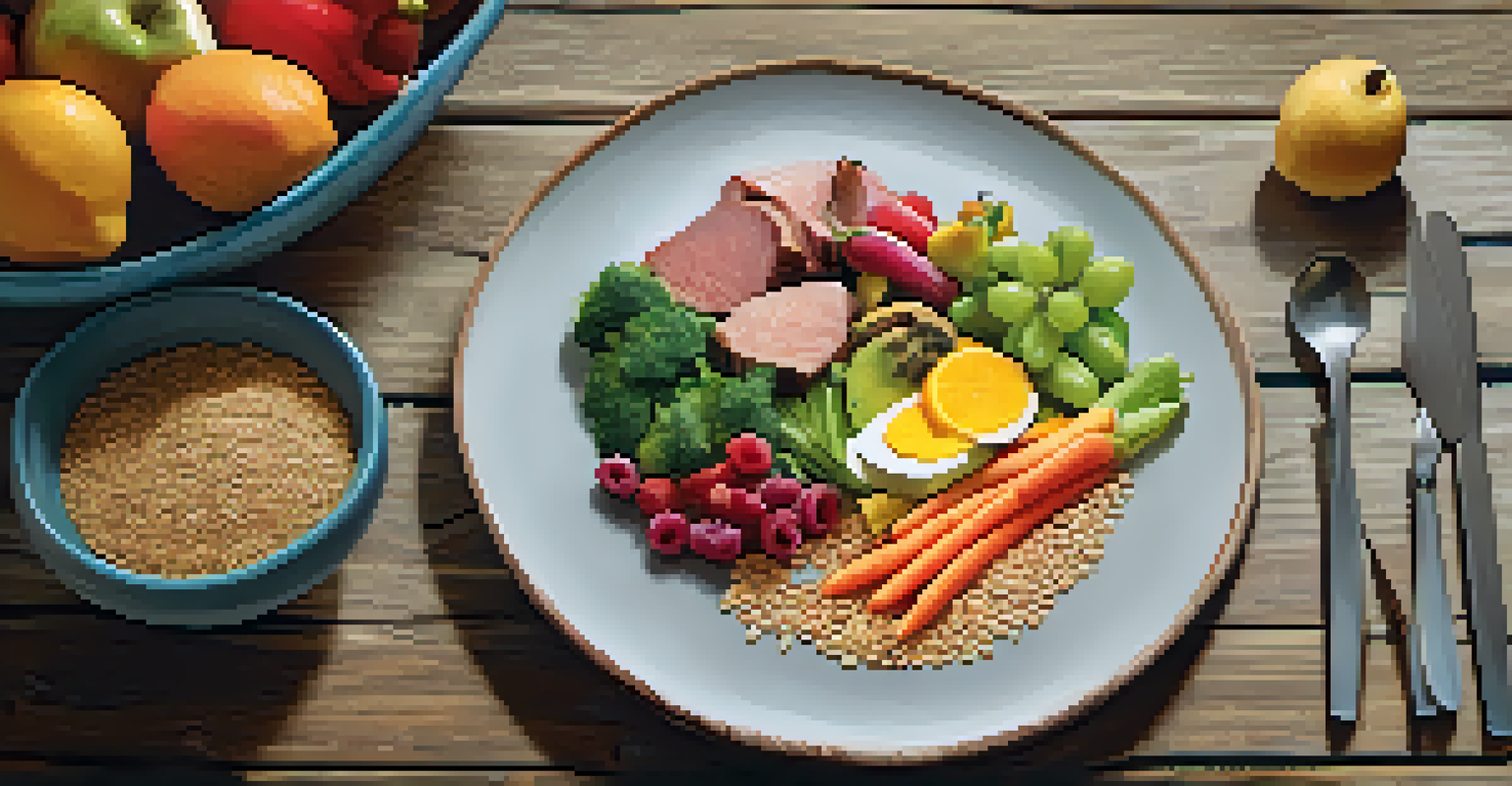The Influence of Nutrition on Martial Arts Tournament Performance

Understanding the Basics of Sports Nutrition
Sports nutrition is all about fueling the body for optimal performance. It's crucial for martial artists to understand the balance of macronutrients—carbohydrates, proteins, and fats—to support their training and competition needs. Carbohydrates provide the energy required for intense sparring sessions, while proteins aid in muscle recovery and repair.
Nutrition is not just about eating, it’s about learning to live.
Moreover, fats are essential for long-term energy, especially during longer training sessions. It's like filling up your car with the right fuel; without the right nutrients, your body won't perform at its best. A well-rounded diet tailored for martial arts can make a significant difference in endurance and strength during tournaments.
Incorporating a variety of foods into the diet, such as whole grains, lean meats, fruits, and vegetables, ensures that martial artists receive all the essential nutrients. Understanding these nutritional components helps athletes make informed choices that can enhance their performance on the mat.
The Role of Hydration in Performance
Hydration is another crucial aspect of nutrition that can’t be overlooked. Dehydration, even at mild levels, can lead to decreased performance, slower reaction times, and impaired focus—all vital for success in martial arts tournaments. Keeping the body well-hydrated helps maintain energy levels and enhances physical capabilities during bouts.

Athletes should aim to drink plenty of water throughout the day, especially before and during training sessions. A good rule of thumb is to drink at least half your body weight in ounces of water daily. This practice can be likened to watering a plant; without enough water, it simply won’t thrive.
Fuel Your Body for Performance
Understanding macronutrients like carbohydrates, proteins, and fats is essential for martial artists to optimize their training and competition performance.
In addition to water, electrolyte-rich drinks can be beneficial, particularly during intense training or competition. These drinks help replenish lost minerals and maintain electrolyte balance, which is essential for muscle function and overall performance.
Timing Your Meals for Peak Performance
Meal timing is an essential strategy that can significantly impact performance. Consuming the right foods at the right times can provide athletes with a competitive edge. For instance, having a balanced meal two to three hours before a tournament can ensure that energy levels are optimal without feeling sluggish.
The human body is like a car. It needs the right fuel to run efficiently.
A combination of carbohydrates and proteins can be particularly effective; think of a turkey sandwich on whole-grain bread or a smoothie with fruits and yogurt. These meals provide sustained energy and promote muscle recovery. It’s crucial to experiment with timing and types of foods during training to find what works best for each individual.
Additionally, post-tournament nutrition is just as important. Refueling with a mix of protein and carbohydrates can aid recovery and help repair muscles after a demanding competition. This strategy can make the difference between feeling drained and being ready for the next challenge.
Understanding Individual Dietary Needs
Every martial artist is unique, and so are their nutritional needs. Factors such as body type, weight class, and training intensity play a role in determining what each athlete should eat. For example, a lightweight may focus more on maintaining energy without gaining weight, while heavier athletes may prioritize muscle mass.
It’s essential for athletes to listen to their bodies and adjust their diets accordingly. Keeping a food diary can help track what foods improve performance and which may lead to discomfort or fatigue. This can be likened to tuning a musical instrument; every athlete needs to find the right notes that resonate with their body.
Hydration is Key to Success
Staying well-hydrated enhances energy levels and mental focus, which are crucial for martial artists during training and tournaments.
Consulting with a sports nutritionist can also provide tailored guidance. These professionals can help create personalized meal plans that align with an athlete's specific goals, making nutrition a strategic part of their training regimen.
Supplements: Do They Help or Hinder?
Supplements can be a hot topic in the world of sports nutrition. While some athletes swear by them, it’s essential to approach supplements with caution. They should not replace whole foods but can complement a well-rounded diet if used wisely. Common supplements like protein powders or omega-3 fatty acids can provide additional support when needed.
However, it’s crucial to research and choose high-quality products, as not all supplements are created equal. Some may contain harmful additives or may not deliver the promised benefits. A good analogy here is using a crutch; it can help but shouldn’t be relied upon excessively.
Ultimately, the best strategy is to focus on getting most nutrients from whole foods and use supplements as a backup, if needed. Consulting with a healthcare provider can help determine if supplements are necessary and safe for individual circumstances.
The Impact of Nutrition on Mental Focus
Nutrition doesn’t just affect physical performance; it also plays a vital role in mental focus and clarity. Consuming a diet rich in omega-3 fatty acids, antioxidants, and vitamins can support brain health and cognitive function. Foods like fatty fish, berries, and leafy greens can boost memory and concentration, essential for tactical thinking in martial arts.
Just as a well-maintained engine runs smoothly, a nutritionally balanced diet helps keep the mind sharp. Martial artists need to stay mentally agile to anticipate their opponent's moves and react quickly. Poor nutrition can lead to fatigue and clouded judgment, which can be detrimental during high-stakes tournaments.
Customize Your Nutrition Plan
Individual dietary needs vary among martial artists, making it important to tailor nutrition strategies based on personal goals and training intensity.
Incorporating brain-boosting foods into daily meals can enhance overall performance. This could mean starting the day with a smoothie packed with spinach and berries or snacking on nuts and seeds during training breaks.
Strategies for Pre-Tournament Nutrition
Pre-tournament nutrition strategies are crucial for martial artists looking to perform at their best. In the days leading up to a competition, it’s important to focus on carbohydrate loading to maximize glycogen stores. This means increasing carbohydrate intake to ensure the body has plenty of fuel for intense bouts.
On the day of the tournament, sticking to familiar foods is key. Trying something new could lead to digestive issues, affecting performance. Athletes should opt for easily digestible meals, such as oatmeal or bananas, to keep energy levels steady without feeling bloated.

Lastly, maintaining a balanced approach to eating, combined with adequate hydration, can help set the tone for a successful tournament day. It’s all about preparing the body to perform optimally when it counts the most.